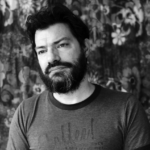Featured Essay |
“Soap: Art of Failure”

“What if instead of saying we have failed we say that we are failuring? What if a practice of imagination is often also a practice of failure?”

“What if instead of saying we have failed we say that we are failuring? What if a practice of imagination is often also a practice of failure?”

“So difficult, this loss: / to imagine your pages / are those of a dead man, / and that death’s colleagues / are the ones / consoling you now.”

“How do you identify yourself when traditional modes of identification, right down to your very name, are troubled? Take My Name is essentially a catalogue of the methods, all imperfect, that Dai has chosen.”

“This is a cross-state / drive of faded billboards, endless sagebrush, // crowded rest stops and unemployed landmarks, / a countryside the boy quietly grows to accept, // until they reach the first signs of city life …”

“The past comes and walks by your side once more. / Don’t change your heart, don’t be charmed. / Don’t linger, take leave of the time …”

“What would it be like to spend an entire night here, not waiting for anyone? The thought edged plausibility. If she was lonely and looking for a place to drive and feel unbothered, this would be the place.”

“I was carrying a copy of Shirt in Heaven, Jean Valentine’s final collection of poetry, on one of the last evenings I saw her. It was 2017 and she was reading at Yale’s Beinecke Library.”

“Alpers is at home with theory but prefers to stand in awe before Vermeer and Velázquez, absorbing, one-on-one, larger questions of chronology and technique.”

“Your usual grief is thick, pervasive, oozing / over everything, but tonight it’s erratic, an itchy // tag that scrapes your waist and some days you think of him / less …”

“Many of the stories grapple with the question posed in Kristóf’s memoir: ‘What would my life have been like if I hadn’t left my country? More difficult, poor, I think, but also less solitary, less torn. Happy, maybe.'”

“I called upon all residents of Omsk who follow me on social media to contact the fitness club where Roman was working and demand his firing for threatening women. My request went far and wide — tens of thousands of reposts, scores of news items in major media.”

“Ravinthiran offers us another metaphor of selfhood, and a new kind of autobiography, one for a late capitalist world in which we must think of global priorities and of selves that exceed national borders.”

“I’ll Come To You is a record of how Kauffman enacted her approach to a mystery – what do people actually want from each other, and what gets in the way of providing or receiving it?”

“The rock was beginning to understand that each day would be different, each day bringing subtle changes in the experience of being rolled up the hill and released to forge new trails.”

“It was the kind of town where if your neighbors / saw you walking, they assumed you’d lost your license — / too many DUIs — or your car, too many payments // missed.”

“These husks of civic duty. These masks dissolved to the bone beneath. / This hand over a mouth. Over a million mouths. Over // infinite mouths open for a scream so long in coming it sparked / the ancient seas to life.”

“When the ‘I’ appears in Adams’ poems, it’s not to offer the stamp of emotional authenticity, but to take advantage of the many masks that a skilled raconteur can adopt.”

“But there was something in the dirt, in the water, my mom’s cousin Troy said — a toxic fallout that made its way into the bodies of the people.”

“The erasure between the lyric and narrative drives is something I aspired to achieve in my own work, but it wasn’t until I read Rulfo’s novel that I learned how to do it.”

“And we also know how birdlike we are, / enchanted in every entrapment / by the promise of a clear escape …”

“I lift the branch, and the ant resumes its task. I pass an enormous anthill teeming with movement. Someone has placed a plastic straw in an opening and the ants tunnel out, landing in a heap on top of each other.”

“We talk about art embodying ideas and feelings, but I think it’s worth talking about poems — some poems, at least — as bodies unto themselves, bodies a mind can make …”

“She observes neighborhood life and the diverse work of housing activists, artists, community gardeners, small business owners who stimulate our thinking about and cultivate the gratifications of dailiness.”

“Some would say this is no life at all, / but how could that be, / when all of my life is / eternally present?”

“Whereas I’ve spent my life avoiding guns, Wagner faces them straight on. As it turns out, both of us had something to learn from Annie Oakley: ‘She knew to not look at the gun, but at the thing, / to point at what you wanted until it fell / at your feet.'”

“At least he won’t feel the wind, still / blowing cold in May or the rusty hinge / call of the Prairie Larks. His father lies by his side.”

“As much as this collection reflects upon lives shared over decades past, it also looks forward with curiosity, understanding that the ‘scent of lost affection, / is what gives loneliness its worth.'”

“Put / My boat in air, my oar through. / I’m // Damp in the heart. I’m a rotted / Knot. / The past is what I’ll grovel over // Until I can kill the air of wishes.”

“The group around the bonfire / fires off bon mots, their laughter / raucous, covetous, spiteful. // They hedged their bets and lost …”

“Cheng unveils the devastating consequences of grief on a family in the Australian suburbs during the Covid pandemic … a nuanced exploration of family dynamics amidst loss and the enduring power of hope.”

“A washer woman dies in a mining village in the Donbas, Ukraine in July of 2014, and two days later a foreign passenger jet is blown out of the sky. In the novel’s mystical world, these seemingly unrelated events acquire the force of world-shattering causality.”

“The left foot, yours — that scar from the bone spur — / the belly was yours. How were you not there? // The snow was falling. It just kept on falling.”

“Her lipstick: unapologetic / crimson. Lacquered hollyberries on the Christmas / brooch pinned each year to the collar / of her winter coat. Patterned red apron, / in the yellow kitchen.”

“… They were ugly / And cheap and we bought them / When we were poor / And it is now so easy to let them / Go not because we are / Rich but because we have no / Heart for what we no / longer desire.”